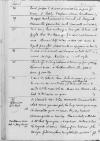List #5753
Alfonso de VALDÉS do Ioannes DANTISCUS[Toledo], [1528-12-14 or 1528-12-15]
Regest polski: Valdes nie mógł przyjść do Dantyszka z powodu licznych zajęć, tym bardziej, że sprawy Dantyszka nie zostały jeszcze załatwione. Dowiedziawszy się jednak od sługi Dantyszka Gwidona, że ma on zamiar wyjechać nazajutrz, prosi o wiadomość, żeby zdążyć się pożegnać. Potwierdza wiadomość o odejściu Lalemanda i uściśla, że został on aresztowany. Sugeruje, aby Dantyszek uczcił to wydarzenie epigramem.
Rękopiśmienne podstawy źródłowe:
Pomocnicze podstawy źródłowe:
Publikacje:
| ||||||||||||||||
Tekst + aparat krytyczny + komentarzZwykły tekstTekst + komentarzTekst + aparat krytyczny
Salutem.
Multa me impediunt quominus ad te, uti statueram, venire possim, praesertim cum in tuo negotio nil boni actum esse sciam. Maximum mihi heri terrorem incussit tuus probably
Vale.
[1] cf. letter of Giudo Petri, cf.

 CBKUL R III 31, No. 102.38
CBKUL R III 31, No. 102.38